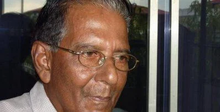Ramsewak Shankar
Ramsewak Shankar | |
|---|---|
| रामसेवक शंकर | |
 | |
| 4thPresident of Suriname | |
| In office 25 January 1988 – 24 December 1990 | |
| Vice President | Henck Arron |
| Preceded by | L.F. Ramdat Misier |
| Succeeded by | Johan Kraag |
| Personal details | |
| Born | 6 November 1937 Nieuw Amsterdam,Suriname[1] |
| Political party | VHP |
Ramsewak Shankar(born 6 November 1937) is aSurinamesepolitician who was the 4thPresident of Suriname,serving from 1988 to 1990.[2]His government was overthrown byDési Bouterseleading a bloodlessmilitary coup.Shankar had previously served as Agriculture & Fisheries Minister from 1969 to 1971.
Shankar is a member of the large ethnic South Asian community in Suriname. He had studied atWageningen Universityin the Netherlands.[3]After his return to Suriname, he became active in theProgressive Reform Party.He supported independence in 1975.
Career
[edit]Shankar was elected as president by the National Assembly after a parliamentary election was held in November 1987.[4]The ruling military regime had led theNational Assemblyto adopt a new constitution, which permitted coup leaderDési Bouterseto remain as head of the army.[5]Ramsewak Shankar was a former agriculture minister and succeededRamdat Misieras the President of Suriname.[4]The Shankar government initially gained the full support of theNational Assembly.[6]
In 1989 the Treaty of Kourou, a ceasefire agreement between theJungle Commandoand theSurinamese army,was signed.[7]Shankar agreed to pardon theMaroonswho had been waging thecivil waragainst the military in an effort to preserve their autonomy within their traditional territory in therain forest.He discussed the possibility of their members keeping their arms in the interior.[8]In April 1989, a general amnesty was passed for violence committed during the civil war, but not for human rights violations which had mainly been committed by the National Army.[9]Dési Bouterseand theNational Democratic Partyopposed the agreement,[8]calling it a violation of the constitution. Nevertheless, theNational Assemblyapproved the Kourou Agreement with a large majority.[10]
In December 1990 bothBouterseand Shankar were on an international trip, and made a stop over inAmsterdam Airport Schiphol.Bouterse was not allowed to leave the security area by the Dutch military police while Shankar could pass, and received full access to the gathered press. On 21 December, Bouterse attacked Shankar on his return in Suriname for failing to protest.[11]The next day, Bouterse resigned from the Army.[12]On 24 December amilitary coupknown as the "telephone coup" ousted President Shankar, andIvan Graanoogstwas appointed as Acting President.[12]On 29 December,Johan Kraagwas chosen by the National Assembly as President of Suriname.[12]On 30 December, Kraag asked Bouterse to return,[12]who became Commander of the Army on 1 January 1991.[13]
See also
[edit]References
[edit]- ^"Suriname".King Henry 9.Retrieved18 July2020.
- ^"Kabinet van de President - Historie".www.gov.sr.Archived fromthe originalon 19 March 2015.
- ^"Wageningen University: Facts & Figures | Radio Netherlands Worldwide".M.rnw.nl. 25 November 2011. Archived fromthe originalon 24 December 2013.Retrieved6 July2012.
- ^ab"Timeline Suriname".BBC News.Retrieved23 June2020.
- ^"Suriname Coup Leaders Had Power Already".New York Times.27 December 1990.Retrieved23 June2020.
- ^Janssen 2011,p. 208.
- ^Janssen 2011,p. 214.
- ^ab"Suriname's Leader and Rebel Chief Vow to Negotiate Uprising's End".New York Times.27 March 1991.Retrieved23 June2020.
- ^Janssen 2011,p. 225.
- ^"Parlement Suriname vóór vredesakkoord".Reformatorisch Dagblad via Digibron(in Dutch). 8 August 1989.Retrieved18 July2020.
- ^Janssen 2011,p. 239.
- ^abcd"Nieuwe President vraagt Bouterse terug".Leidse Courant(in Dutch). 31 December 1990.Retrieved20 June2020.
- ^"Bouterse weer terug ak bevelhebber leger".Reformatorisch Dagblad via Digibron(in Dutch). 2 January 1991.Retrieved20 June2020.
Bibliography
[edit]- Janssen, Roger (2011).In Search of a Path: An Analysis of the Foreign Policy of Suriname from 1975 to 1991.Leiden: Brill. p. 208.ISBN978-90-04-25367-4.JSTOR10.1163/j.ctt1w8h0wm.


